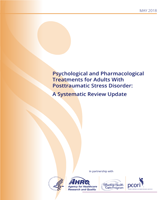| Population Included in the Review | Key Inclusion Criteria | Adults ≥18 years of age with PTSD based on any DSM criteria, RCT study designs (or SRs to search references), or non-RCTs with at least 500 subjects for the adverse event KQ (#4) |
| Key Exclusion Criteria | Studies with participants <18 years of age, studies without RCT study designs, or studies without at least 500 subjects for KQ4. |
| Key Topics & Interventions Covered by Review | Key Topics | Interventions |
| 1. Benefits of psychological treatments; variation in benefits by trauma or other patient characteristics | Brief eclectic psychotherapy, CBT including cognitive restructuring, cognitive processing therapy, exposure-based therapy, coping skills therapy (e.g., stress inoculation therapy, structured approach therapy, relaxation training), psychodynamic therapy, EMDR, interpersonal therapy (IPT), hypnosis or hypnotherapy, neurofeedback, mindfulness-based stress reduction, and energy psychology (including EFT) compared with each other or to an inactive treatment group. |
| 2. Benefits of pharmacological treatments; variation in benefits by trauma or other patient characteristics | Pharmacological interventions: SSRIs (citalopram, escitalopram, fluoxetine, fluvoxamine, paroxetine, and sertraline), SNRIs (desvenlafaxine, venlafaxine, and duloxetine), tricyclic antidepressants (imipramine, amitriptyline, and desipramine), other second-generation antidepressants (bupropion, mirtazapine, nefazodone, and trazodone), alpha blockers (prazosin), atypical antipsychotics (olanzapine, risperidone, ziprasidone, aripiprazole, and quetiapine), benzodiazepines (alprazolam, diazepam, lorazepam, and clonazepam), anticonvulsants/mood stabilizers (topiramate, tiagabine, lamotrigine, carbamazepine, and divalproex) compared to each other or to an inactive treatment group (e.g., placebo). |
| 3. Comparative benefits of psychological versus pharmacological treatments; variation in benefits by trauma or other patient characteristics | One of the psychological treatments compared with one of the pharmacological treatments of interest. |
| 4. Adverse events associated with treatments | Any of the psychological or pharmacological treatments of interest. |
| Timing of the Review | Beginning Search Date | May 2012 for treatments included in prior review. No beginning date for treatments newly added to current review. |
| End Search Date | September 29, 2017 |
